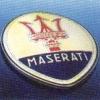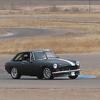Just read my Christmas present,good read but not particularly a good book.Was Mark Donohue as good a driver as he thought he was? or more a case of a fair driver with usually a very good car thanks to Roger Penske;The only competitor he seemed to rate was Dan Gurney,he seemed pretty dismissive of his fellow americans and all the european guys;I never saw him race only read reports in Motoring News
The Unfair Advantage
#1

Posted 30 December 2015 - 17:17
Advertisement
#2

Posted 30 December 2015 - 18:07
Saw him race many times. He was a very good driver and development engineer. Winner of the '69 Daytona 24 hours, the '72 Indy 500, utterly dominant in the 1973 Can Am Porsche 917/30 not to mention F5000 and Trans Am. I cannot imagine anyone saying that he was a fair/average driver. Penske gave him the tools and he used them to help create 'The Unfair Advantage'.......and he was a very nice and personable person to talk to.
#3

Posted 30 December 2015 - 18:51
If he was such a nice guy, it is really true that he was "Dismissive of all the European guys?" Mark was mid-grid at best when racing in F1 with a car that was on a more or less simlilar level to most of the opposition. No question about his engineering and development skills of course.
#4

Posted 30 December 2015 - 21:01
Just read my Christmas present,good read but not particularly a good book.Was Mark Donohue as good a driver as he thought he was? or more a case of a fair driver with usually a very good car thanks to Roger Penske;The only competitor he seemed to rate was Dan Gurney,he seemed pretty dismissive of his fellow americans and all the european guys;I never saw him race only read reports in Motoring News
A 1st (1972) & a 2nd (1970) at the Indy 500 and a 3rd in his first Grand Prix (1971 Canadian GP) is a good record in my book......
Bill P
Edited by bill p, 30 December 2015 - 22:22.
#5

Posted 30 December 2015 - 23:01
What surprised me in the book was, the cars Mark drove were not always as well prepared as people thought. Lots of trial and error. I'd like to be able to compare notes from the competition. Were they in the same situation? IMHO, the best prepared race cars back in the day were those of Group 44.
#6

Posted 30 December 2015 - 23:12
A 1st (1972) & a 2nd (1970) at the Indy 500 and a 3rd in his first Grand Prix (1971 Canadian GP) is a good record in my book......
Bill P
Exactly. Donohue won too many races in too many different series for his driving abilities ever to be questioned.
I read the book 2 years ago and enjoyed it very much. I consider it to be one of the best motoring books, and refer to it often.
I don't think he is really dismissive of other drivers, just honestly expressing an opinion. Of his debut F1 race he is unimpressed with 3rd and puts it down to superior rain strategy; he never did get the McLaren M19 to run properly, according to his standards..
At the time of writing that was his only F1 Grand Prix and he was happy to leave it at that Like some of his American contemporaries he was shocked at the relatively low pay available to a F1 driver. F1 was certainly not the be all for him at the time; he mentioned being unable to afford going to Europe to race F1.
#7

Posted 31 December 2015 - 00:18
I read the book many many years ago and don't remember him being dismissive of anybody. The 71 Canadian GP was the first I ever attended and I remember that Denis Hulme, in the same equipment, tried very hard to pass Donohue but could not. Remember that this was Mark's first GP and he managed to hold off a world champion that had driven many laps at Mosport.
#8

Posted 31 December 2015 - 01:29
Saw him race many times. He was a very good driver and development engineer. Winner of the '69 Daytona 24 hours, the '72 Indy 500, utterly dominant in the 1973 Can Am Porsche 917/30 not to mention F5000 and Trans Am. I cannot imagine anyone saying that he was a fair/average driver. Penske gave him the tools and he used them to help create 'The Unfair Advantage'.......and he was a very nice and personable person to talk to.
I will not only support this view, but even add "Humble" to this description. Mark ws a truly GREAT Guy...........and for confirmation, just ask anyof his actual competitors (Parnelli, Posy, Gurney)
#9

Posted 31 December 2015 - 06:29
Mark was mid-grid at best when racing in F1 with a car that was on a more or less simlilar level to most of the opposition.
My recollection is that Donohue would have embarrassed a whole field of F1 cars/drivers with a lowly Lola T192 F5000 car in the Questor Grand Prix if not for a fuel system failure. He was running third and reeling in the leaders when his crude/unsophisticated Chevy engine started sputtering.
#10

Posted 31 December 2015 - 13:30
Michael Argetsinger's David Bull-published, award-winning 2009 release of Mark Donohue: Technical Excellence at Speed is the best source to look for the many details that made up Mark's life and career and to answer the questions that may arise from reading Unfair Advantage.
https://www.bullpubl....asp?itemid=117
From June 2010; to establish the quality of writing and substance of Michael's detailed work on Mark's story:
Michael Argetsinger’s Mark Donohue Dominates at International Automotive Media Awards
PHOENIX, Ariz.—David Bull Publishing is proud to announce that Michael Argetsinger’s Mark Donohue: Technical Excellence at Speed swept the awards in the 2009 International Automotive Media Competition (IAMC). Argetsinger’s book received a gold medal as best biography and was also cited as the year’s Best Book. Then, at the end of the ceremony, it was announced that it had won over all other entries from the automotive media—including books, magazines, newspapers, Internet, radio, and television—to be named “Best of 2009.” The awards were held on Monday, June 21, 2010 at the Automotive Hall of Fame in Dearborn, Michigan.
Mark Donohue: Technical Excellence at Speed is the first complete biography of Mark Donohue, who redefined what it meant to be a successful driver in the 1960s and 1970s. Driving for his like-minded team owner, Roger Penske, Donohue became a two-time champion in both the U.S. Road Racing Championship and the Trans-Am sedan series before scoring his greatest win at the 1972 Indianapolis 500. Following a brief retirement, Donohue returned to lead Penske Racing’s Formula One effort and died in 1975 after an accident at the Austrian Grand Prix. (B² note - Mark also was the 1968 Martini & Rossi Driver of the Year and the winner of the innaugural IROC series in which Porsches were utilized by all the world-class drivers)
Argetsinger spent years researching and writing the book, which draws upon interviews with Donohue’s family, friends, and teammates, as well as observations from such great drivers as Mario Andretti, George Follmer, David Hobbs, Parnelli Jones, and Sam Posey. He also listened to the original, unedited audio tapes dictated by Donohue for his own 1975 book, The Unfair Advantage. Mark’s close friend and team leader Roger Penske provided the book’s foreword.
This is the second multiple win for Argetsinger in the IAMC. In 2006 his first book, Walt Hansgen: His Life and the History of Post-War American Road Racing, was also named Best Book and Best Biography. “It’s a great honor to be recognized again,” says Argetsinger. “I think the awards are also a tribute to all of the people who helped me by contributing their time and memories of Mark Donohue.”
All of the following is taken from Michael's book In regards to some of the points raised.
Roger Penske is quoted:
"Mark Donohue was the catalyst for all that we have achieved at Penske Racing. When I look at the 300-plus victories and what we've been able to accomplish, I remember that it was Mark who set the standard."
"I remember when he lived above the offices at the Newtown Square race shop. He would work day and night to be certain the car was completely prepared for a race. He was so committed."
From the Introduction of Mark Donohue: Technical Excellence at Speed - "Mark Donohue's record was exceptional: He won a remarkable 38 percent of all the races he entered."
"But Mark's well-earned reputation for testing and development has left him underrated today as a driver. He was blazingly fast, and the speed was there from his earliest days. When he began racing in SCCA he was immediately successful in the highly competitive production-car classes. Having attracted the attention of racing's elite, he broke into professional racing with the support of his mentor, Walt Hansgen, and became a full-time professional with Roger Penske's team. Fellow race drivers knew that Mark's success came more from his driving skill than from his much-touted engineering ability."
'Mark was a better race driver than people ever gave him credit for,' says Bobby Unser. 'Everybody thinks today that the engineering he did and the Penske money was the answer, but I'm going to tell you something - the cat could drive. I mean he was fast. And he would do it lap after lap after lap. He was quicker than bejeezus.' "
Hurley Haywood stated "He was a great talent, but he always liked to say he wasn't much of a driver and that it was engineering skill that made him quick. He was masterful in that and many people have emulated him. Many people wanted to adapt to that mold of the driver-engineer approach that Mark perfected."
Haywood continues - "Mark understood the need to have a good car under him in order to showcase his talent. The best driver is not going to shine in a bad car. That's why he was so intent on the engineering side. Because he found the way to have a really good car most of the time should not detract from the fact that he was also a great driver."
I never recalled Mark being dismissive of anyone, this excerpt from Technical Excellence at Speed states: "Mark was the accessible hero who, even at the height of his popularity, would make himself available to people (B² note - I can personally attest to this from our few meetings from 1969 to 1972) - and not just with a "Hello, nice to meet you." The superstar never behaved like one. At Nassau, after one of his earliest major victories, Mark was so busy satisfying every person eager for his autograph and a friendly word that at the end of the day, he was quite literally the last person at the track, hitchhiking back to town on a garbage truck. He engendered fervent loyalty among flaggers and other track workers. He spent time with them at post-race worker parties where he made genuine friends. He never patronized - he was, in spirit, one with them. When it all happened for Mark it happened fast, and he never lost his sense of wonder in it all."
In regards to kayemod's comment: "Mark was mid-grid at best when racing in F1 with a car that was on a more or less similar level to most of the opposition." Penske Racing had built their first car, the Penske PC1, and I believe you have much higher appreciation for the chassis' capabilities than even those who worked on Team. I have personally talked to the chief mechanic on the car, Karl Kainhofer, and you certainly rate it much better than he. Again, from Technical Excellence when the decision was made to go to the March 751 and use it as a baseline for the newest Penske chassis, PC4, which would win the 1976 Austrian Grand Prix in John Watson's capable hands.
"Mark's fast time testing in the March 751 convinced the team to put the Penske PC1 temporarily aside and race the March. 'When you take a new car out of a box and run two and a half seconds quicker than your old car, then it's just got to make sense,' team manager Heinz Hofer told Autosport. Mark described the advantages of the March over the Penske to Pete Lyons: "It's sensitive to tuning - when you do something you can feel the difference; it's easy to drive; it's got the right aerodynamic properties; it's simple; and it's light." Mark said to Rob Walker, If you gave them 1 to 10 points for racing cars, I would rate the March an 8 and the Penske a 3."
I could go on with much more, but I urge those interested in Mark to follow up Unfair Advantage with Michael's Technical Excellence at Speed - I don't think you will be disappointed, and it will answer many of the questions that a full biography can provide.
Edited by B Squared, 31 December 2015 - 14:09.
#11

Posted 31 December 2015 - 14:21
My recollection is that Donohue would have embarrassed a whole field of F1 cars/drivers with a lowly Lola T192 F5000 car in the Questor Grand Prix...
I think some might say he actually did…
- - - - - - - -
I’ll be banging the same drum as most others here, but:
I first read Mark Donohue’s book a long, long time ago, and have re-read it several times - and sometimes dip into an odd chapter to recall something, or just for the pleasure of reading it. It’s a marvellous book - quite unusual in its day, and it reveals a remarkably analytical, perceptive and self-critical man. Still one of my all-time favourite motorsport reads.
Few drivers have the palmarès that his career can claim, or cover success in such a range of categories.
He stood on the podium after his debut Grand Prix, in the wet, in a car which, it seems, its creators had - for the time being - lost their way with; even then he didn’t solve all the car’s problems - he just drove around them. Aside from his victories, there are a number of ‘oh-so-nearly’ races and impressive performances of the kind that embellish rather tarnish Chris Amon’s reputation.
Some argue that Donohue had the advantage of spending most of his career with the same top-flight team. The same conditions do not seem to be used to lessen the achievements of Jim Clark , yet Mark played a significant role in the engineering and development of his cars too; that aspect was his achievement too - and from his book we can sense that his engineering input was informed by his talent and perceptiveness as a driver.
True, he may not have achieved all he did without the continued support, faith and confidence of Penske - but where would Penske be without Mark Donohue?
His versatility, also, was mighty impressive (not unlike fellow Americans, Andretti, Gurney, Foyt, and maybe Adamowicz too).
For my money, Mark Donohue was a fabulous driver.
Edited by 2F-001, 31 December 2015 - 14:23.
#12

Posted 31 December 2015 - 14:25
For my money, Mark Donohue was a fabulous driver.
![]()
#13

Posted 31 December 2015 - 16:24
What comes across in The Unfair Advantage,is the incredible standards Donohue imposes on himself. what other driver would be disappointed in a podium finish in his maiden Grand Prix? Or, upset that a F5000 car had not placed him 3rd or better against the cream of F1 cars and drivers at the Questor race? If he is critical of some drivers, it is because they do not share his 100% level of commitment and sometimes just go through the motions. As 2F-001 implies a great deal of Penske's success could be attributed to Mark Donohue..
#14

Posted 31 December 2015 - 16:52
Sam Posey's recent book(excellent BTW) has a chapter on MD; SP always seemed very much his own man yet his admiration for MD is huge- and rightly so in the light of everything I know about the man . With whom , incidentally, I once shared a petrol station forecourt near Towcester. Me in a Riley 1300 and Mark in a black 911- I even have a photo somewhere.
#15

Posted 31 December 2015 - 17:06
Sam Posey's recent book(excellent BTW) has a chapter on MD; SP always seemed very much his own man yet his admiration for MD is huge- and rightly so in the light of everything I know about the man . With whom , incidentally, I once shared a petrol station forecourt near Towcester. Me in a Riley 1300 and Mark in a black 911- I even have a photo somewhere.
I'd love to see that photo should you happen upon it. Michael tells of adventures Mark had in that black Porsche 911 in Technical Excellence at Speed; one described it as a "wall of death" type ride.
Off subject note: I posted no quote functions working for the past two days in Website Feedback and now it has miraculously returned. Thanks!
#16

Posted 31 December 2015 - 23:32
As for his splendid P3 finish at Mosport in his F1 debut in '71, the year prior in a FA/F5000 race at the same venue, he positively trounced the opposition
in the rain. Hope Allan doesn't mind the link I'm providing below...
http://www.oldracing...php?RaceID=MS70
#17

Posted 01 January 2016 - 15:40
x2
HAPPY NEW YEAR all
#18

Posted 01 January 2016 - 18:23
So far as any F1 shortcomings, he was in his mid-thirties already and had "retired" prior to that if I recall correctly. The car needed more time for development, I think his heart wasn't into it like before, and short of his awesome debut, we never got to see what he could have done if earlier in his career.
#19

Posted 02 January 2016 - 18:34
Technical excellence at Speed,will have to put on next years christmas wish list,too expensive now.I always thought the Porsche 917/30 one of the all time great racing cars( Bentley Speed 6,Jaguar D type,GT40 Lotus 49) but it ended up as a sledge hammer to crack a walnut.The works teams had gone .
Advertisement
#20

Posted 02 January 2016 - 19:08
Technical excellence at Speed,will have to put on next years christmas wish list,too expensive now.I always thought the Porsche 917/30 one of the all time great racing cars( Bentley Speed 6,Jaguar D type,GT40 Lotus 49) but it ended up as a sledge hammer to crack a walnut.The works teams had gone .
Stiffy, have the above posts changed your opinion on Mark??
Bill P
#21

Posted 02 January 2016 - 19:44
Technical excellence at Speed,will have to put on next years Christmas wish list,too expensive now.I always thought the Porsche 917/30 one of the all time great racing cars( Bentley Speed 6,Jaguar D type,GT40 Lotus 49) but it ended up as a sledge hammer to crack a walnut.The works teams had gone .
In the early 1980s, Keith Duckworth amusingly dismissed Porsche's long series of successes at Le Mans as "pinching jam from kids."
#22

Posted 02 January 2016 - 20:59
I listened patiently while a prominent racing car collector and Le Mans competitor extolled the virtues of the Audi series of LM-winning sports-prototype cars as qualifying them to be absolutely on top of the pyramid when historic significance is concerned, completely outclassing the Porsche 917, the Mercedes-Benz W196 and 300SLR, assorted Ferraris and Jaguars and pre-WW1 Peugeots. At the time I was able to break his stride and reduce him to spluttering near silence when I remarked "Yeah but...who did they beat...????". In more recent years their quality has been put into some perspective by more adequate opposition, but that certainly wasn't true at the time. For many years Moss always warned me not "to confuse Le Mans with a motor race" - but that most decidedly hasn't been the case for several years now, since impressive technology has enabled it to become more or less a sequence of 24 one-hour sprints joined end-to-end.
DCN
#23

Posted 02 January 2016 - 23:20
At the time I was able to break his stride and reduce him to spluttering near silence when I remarked "Yeah but...who did they beat...????"
DCN
Ah yes, you've learned well my son, the old Jenks question when he thought any car or driver was being over-praised.
#24

Posted 03 January 2016 - 02:54
![]()
#25

Posted 03 January 2016 - 09:12
"Mr Nye is correct in asking what did it beat,but that doesnt stop it from being great ,just more difficult to quantify or justify.Perhaps I should have used the word" Iconic".Back to topic before I am pulled up by the forum police.Probably for me the question is who did MD beat consistantly,in period there was very little coverage of Trans Am or Can Am in the UK where as Le Mans,Indy,F1 and even Nascar got more coverage.The Americans who raced consistently in these categories got more coverage,Andretti,Hill,Gurney,Revson,Foyt, Unser and Petty.That doesnt stop MD being great just like the 917 /30 more difficult to quantify.
#26

Posted 06 January 2016 - 02:34
Was Mark Donohue as good a driver as he thought he was?
I don't know how anyone could read the Unfair Advantage and come away with that impression...
What comes across in The Unfair Advantage,is the incredible standards Donohue imposes on himself. what other driver would be disappointed in a podium finish in his maiden Grand Prix? Or, upset that a F5000 car had not placed him 3rd or better against the cream of F1 cars and drivers at the Questor race? If he is critical of some drivers, it is because they do not share his 100% level of commitment and sometimes just go through the motions.
Absolutely...
#27

Posted 06 January 2016 - 03:52
MD won the early IROC series when they used Porsches - all prepared to the same specs.
Robert
#28

Posted 06 January 2016 - 04:11
#29

Posted 06 January 2016 - 13:08
MD won the early IROC series when they used Porsches - all prepared to the same specs.
Robert
…in the same year that he won the Can Am championship; and won a Nascar round too, albeit an early-season road-course event - though his oval-track ability is not in doubt: he won the Indy 500 at the time he was busy developing the 917-10
Donohue often ran multiple program(me)s concurrently - rather more common back then, but less so if you were involved in all the engineering and development too; and sometimes he was switching between single-seaters, sportscars and Trans Ams. That year of his F1 debut in Cananda he also ran in F5000 (eg. the aforementioned near giant-toppling Questor GP drive) and dominating Trans Am. Half a dozen top-six finishes in World Manufacturers' rounds in five different cars isn't too bad (including one in a Camaro... ), and he was (sharing with Chuck Parsons) the only one who managed to win a WMC/WSC race with a Lola T70.
As to 'who did he beat?', well it's an impressive list; that first year of Can Am, where finished runner up to an established former WC 'name', was fairly star-studded for a start.
There is a little more on the esteem in which he was held (even in his early years) by both Ford and GM to be found in van Valkenburgh's Fourteen years of raucous silence.
- - - - -
A question for those more clued-up than I on the American scene...
Many published references list Trans Am 'Driver's Championship' winners back to 1966, including the three for Donohue, yet other sources suggest that a drivers' title was not officially awarded until post-1971(?) - the emphasis being on a Manufacturer's championship.
Could anyone confirm, refute or clarify this for me?
Edited by 2F-001, 06 January 2016 - 13:25.
#30

Posted 06 January 2016 - 13:41
Remembering only from reading Competition Press & Autoweek in my youth, the Manufacturer's Championship was all that was displayed in their recaps and I don't recall Mark winning any official Driver's Championship at the time.
#31

Posted 06 January 2016 - 14:00
Thank you, Brian; I was suspecting that was the case. I'm guessing that someone, somewhere, calculated what the points positions would have been for drivers and then published them - to be repeated serially elsewhere.
I have the series of Trans Am history articles by Rich Taylor in Vintage Motorsport; I'm minded to go back and re-read them.
#32

Posted 06 January 2016 - 14:17
Originally posted by 2F-001
…in the same year that he won the Can Am championship; and won a Nascar round too, albeit an early-season road-course event - though his oval-track ability is not in doubt: he won the Indy 500 at the time he was busy developing the 917-10
Donohue often ran multiple program(me)s concurrently - rather more common back then, but less so if you were involved in all the engineering and development too; and sometimes he was switching between single-seaters, sportscars and Trans Ams. That year of his F1 debut in Cananda he also ran in F5000 (eg. the aforementioned near giant-toppling Questor GP drive) and dominating Trans Am. Half a dozen top-six finishes in World Manufacturers' rounds in five different cars isn't too bad (including one in a Camaro... ), and he was (sharing with Chuck Parsons) the only one who managed to win a WMC/WSC race with a Lola T70.
As to 'who did he beat?', well it's an impressive list; that first year of Can Am, where finished runner up to an established former WC 'name', was fairly star-studded for a start.
There is a little more on the esteem in which he was held (even in his early years) by both Ford and GM to be found in van Valkenburgh's Fourteen years of raucous silence.
Well done...
A post to be re-read from time to time.
#33

Posted 06 January 2016 - 14:43
A question for those more clued-up than I on the American scene...
Many published references list Trans Am 'Driver's Championship' winners back to 1966, including the three for Donohue, yet other sources suggest that a drivers' title was not officially awarded until post-1971(?) - the emphasis being on a Manufacturer's championship.
Could anyone confirm, refute or clarify this for me?
SCCA formed the Trans Am Series in 1966. Initially it was strictly a manufacturers' championship. It was not until 1972 that the driver's championship was added. Subsequently, SCCA retroactively figured points for drivers and declared champions for the years when they did not do so at the time.
There is no question about the years 1967-71, as the points shake out properly. There still is some controversy about 1966 as the best in points on a strict top six overall basis was Bob Johnson. However, that year for whatever reason SCCA awarded equal points for the under two liter class and lumped them all together for the overall champion. Hence, SCCA says that under two liter racers Horst Kwech and Gaston Andrey were the champions, even though they had less overall points than Johnson.
So gimmicked championships are not peculiar to nascar's silly chase or Indy Car's asinine double point finales.
Tom
#34

Posted 06 January 2016 - 15:24
Oh - that's interesting, Tom; so those titles are 'official', but retrospectively awarded.
The 'same points for the classes' thing: that's how the British Saloon Car Championship ran for a long time. We had four classes running together (though sometimes split into two races at smaller circuits) and it was common for the overall title to go to a small-capacity class winner - indeed, after Frank Gardner in '73 it was a decade or more before we had another overall champion from the big class (two on the trot for Andy Rouse) and then never again until we switched to a single 2-litre class format.
(As with the Trans Am situation, this was dependent on the relative strength of the classes or the dominant performance of a particular competitior; it was still fairly unusual for a tiddler to win overall, even when the big class was a bit lacklustre).
I don't know if we thought of it as gimmicky at the time, though it took some explaining to friends who had a more casual interest in the sport. I usually managed to be absorbed by battles further down the field, but often it seem a pity that the smaller cars didn't get the prominence and prestige of their own race.
Anyway, that's a fair way off-topic; I'm not sure we're done (ap)praising Mr Donohue yet, are we...?
#35

Posted 06 January 2016 - 20:04
However, that year for whatever reason SCCA awarded equal points for the under two liter class and lumped them all together for the overall champion. Hence, SCCA says that under two liter racers Horst Kwech and Gaston Andrey were the champions, even though they had less overall points than Johnson.
So gimmicked championships are not peculiar to nascar's silly chase or Indy Car's asinine double point finales.
Tom
And, of course, SCCA did the same thing in the 1965 USRRC--George Follmer in a 2 liter Lotus 23-Porsche won over Jim Hall's small block Chaparral. I always thought that was a crime, not that George wasn't a terrific driver even then or that his Lotus-Porsche wasn't quite fast (frequently beating over 2 liter cars) but he didn't have the competition that Hall faced in over 2 liters, in my opinion.
Gerry
#36

Posted 06 January 2016 - 21:55
~
The 'same points for the classes' thing: that's how the British Saloon Car Championship ran for a long time. We had four classes running together (though sometimes split into two races at smaller circuits) and it was common for the overall title to go to a small-capacity class winner - indeed, after Frank Gardner in '73 it was a decade or more before we had another overall champion from the big class (two on the trot for Andy Rouse) and then never again until we switched to a single 2-litre class format.
~
And at one time the classes were based on price. One Tony Lanfranchi realised that the Moskvitch qualified for the lowest Class (under £600 or something like that) with only 850cc Minis, Honda N600s and Reliant Kittens to beat. He duly won his class in 28 of the 29 races and took the championship. Two years running I think.
Not Mark Donoghue, but surely another case of the "Unfair Advantage"
#37

Posted 06 January 2016 - 23:21
And at one time the classes were based on price.
But that wasn't the British Saloon/Touring Car Championship - that was a separate Production Saloon series.
#38

Posted 07 January 2016 - 04:47
All of the conjecture above is wonderful. Mark was a great driver and more . No mas.
#39

Posted 07 January 2016 - 10:56
http://www.indycar.c...nske-50th-Bates
Advertisement
#40

Posted 07 January 2016 - 11:15
Mark was a fabulous driver, and perhaps more importantly, a wonderful guy. I spoke with him many times as a kid, always as gracious as he could be, and a best friend often reminisces about the day he sat with Mark and ate a sandwich offered to him. The Stuff of Legends.
So far as any F1 shortcomings, he was in his mid-thirties already and had "retired" prior to that if I recall correctly. The car needed more time for development, I think his heart wasn't into it like before, and short of his awesome debut, we never got to see what he could have done if earlier in his career.
Correct. If one reads the Unfair Advantage, the last chapter is about the Race of Champions (?) with Porsches, which was sort of his 'Goodbye'-concert... which he won, by the way. Then he retired. So the autobiography ends there... Then he came back to race F1. There are photo's in the book of Mark in the Penske F1-car, which is a bit confusing, I might say...
#41

Posted 07 January 2016 - 11:33
Thanks
Rob
#42

Posted 07 January 2016 - 13:24
In Unfair Advantage, mention is made of Jack Griffith - whose Cobra Mark raced a few times - in the context of his plans to put big Ford motors into Granturas (as a sort-of Cobra alternative), and a passing reference is made to a later business involvement with him in the development of such a machine (an involvement with, we are told, an awkward outcome from a legal standpoint). But there is no suggestion there that Donohue raced one; it does say that during Donohue's preparation of his Mustang deal in 1965 (he wanted Griffith's mechanic to work on the car) Griffith was still 'talking about' the TVR-based project rather than doing it.
I don't remember seeing much reference to Mark racing a TVR - other than some results lists, I mean (and presumably not the big Ford-engined variety for the years you mention); what information do you have on that?
Edited by 2F-001, 07 January 2016 - 13:41.
#43

Posted 07 January 2016 - 13:44
Michael's Mark Donohue: Technical Excellence At Speed references TVR in the Index for pages 37-38; 39-40; 41 & 63
Edited by B Squared, 07 January 2016 - 14:20.
#44

Posted 07 January 2016 - 14:09
Rob
#45

Posted 07 January 2016 - 14:15
And, of course, SCCA did the same thing in the 1965 USRRC--George Follmer in a 2 liter Lotus 23-Porsche won over Jim Hall's small block Chaparral. I always thought that was a crime, not that George wasn't a terrific driver even then or that his Lotus-Porsche wasn't quite fast (frequently beating over 2 liter cars) but he didn't have the competition that Hall faced in over 2 liters, in my opinion.
Gerry
To this day Jim Hall is still peeved at this. With all due respect to George Follmer, Jim considers himself to be the true 1965 USRRC champion.
And I do too.
Tom
#46

Posted 07 January 2016 - 18:19
#47

Posted 07 January 2016 - 22:13
+2




























